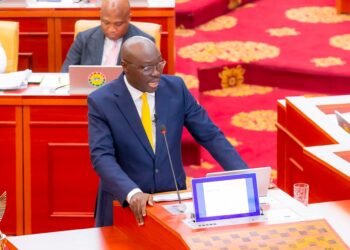As Ghana continues to grapple with persistent power challenges, stakeholders in the renewable energy sector are urging the new administration to prioritize solar energy as a sustainable and viable solution.
This call is backed by recent research from the Brew-Hammond Energy Centre at the Kwame Nkrumah University of Science and Technology (KNUST), which underscores the immense potential of solar energy in addressing Ghana’s energy crisis.
The study, titled “Scaling up Distributed Solar PV Adoption in Ghana: A Focus on the Commercial Sector (Real Estate),” examined the barriers, enablers, and opportunities for solar energy adoption in Ghana’s commercial sector.
The research presents concrete recommendations to scale up the use of solar power, particularly in government-funded projects.
Speaking at a dissemination workshop in Accra, the Director of the Brew-Hammond Energy Centre, Prof. David Ato Quansah, emphasized the importance of government leadership in integrating solar energy into public infrastructure.
“It is important that government leads the way. The government is a huge entity with its agencies, so if government projects are integrating solar, then it gives the technology credibility.
“We are happy to hear that the government intends to introduce solar at basic and senior high schools. Imagine these schools running on solar power.”
Prof. David Ato Quansah, Director of the Brew-Hammond Energy Centre
He further revealed that the Brew-Hammond Energy Centre is collaborating with the Ghana Real Estate Developers Association (GREDA) to promote the widespread adoption of solar power in residential and commercial properties.
The research found that many real estate businesses in Ghana have limited awareness of government policies on renewable energy, creating a knowledge gap that hinders effective promotion and implementation.
However, despite this lack of awareness, the study revealed that several real estate businesses possess a high level of technical knowledge regarding distributed solar energy.
The slow pace of adoption is primarily attributed to businesses not fully recognizing the long-term cost benefits of solar photovoltaic (PV) technology.
The study further noted that while the government has introduced a number of renewable energy policies, the rate of adoption remains relatively low.
This highlights the need for increased awareness campaigns and the development of innovative financing mechanisms to facilitate the transition to solar energy.
Government’s Commitment to Solar Energy

The Director for Renewable Energy at the Ministry of Energy and Green Transition, Mahu, noted that Ghana’s renewable energy sector is experiencing significant growth, with multiple initiatives set to transform the country’s power infrastructure.
To expand Ghana’s rooftop solar programme, he revealed that the Ministry has secured 12,000 smart meters as part of its distributed renewable energy initiative, with the first batch of 4,000 units expected to arrive by the end of the second quarter of 2024.
The meters are currently undergoing factory acceptance testing to ensure they meet industry standards before deployment.
The Executive Secretary of GREDA, Samuel D. K. Amegayibor, highlighted the increasing importance of sustainability in the energy sector.
He stated that GREDA has been actively engaging its members on energy-saving initiatives, particularly the potential of solar energy for residential buildings.
“Buildings contribute to about 40 percent of climate change-related issues, therefore there is a pressing need to turn this challenge into an opportunity by using solar systems. We are committed to doing everything within our capacity to make a difference.”
Samuel D. K. Amegayibor, Executive Secretary of GREDA
The real estate sector’s willingness to embrace solar power is seen as a positive step towards reducing the country’s reliance on fossil fuels and enhancing energy security.
Experts believe that real estate developers integrating solar energy into their projects will not only reduce costs in the long run but also contribute significantly to Ghana’s sustainability goals.
As Ghana’s energy demand continues to grow, the call for a shift towards solar energy is becoming louder.
With the backing of research from KNUST and strong advocacy from industry stakeholders, there is growing consensus that solar power could be a game-changer in addressing the country’s power crisis.
The government’s commitment to renewable energy projects and partnerships with private sector players will be crucial in determining how swiftly Ghana can transition to a more sustainable and reliable energy future.
As discussions continue, stakeholders remain hopeful that solar energy will take center stage in Ghana’s long-term energy strategy.
READ ALSO: Ruggedman Shares Stance on Domestic Violence




















